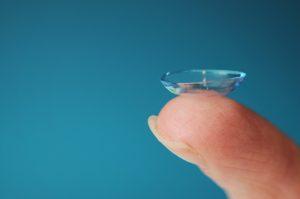Should You Be Sleeping in Your Contacts?

While it’s important to have a clean face and teeth, removing your contact lenses nightly is an absolute necessity and could have a lasting impact on your vision.
Oxygen: The Eyes’ Greatest Need
The biggest reason why you shouldn’t sleep in your contacts is because healthy corneas require oxygen. When you are awake, the contact lens in your eye moves slightly every time you blink. This millimeter of movement is sufficient to supply your cornea with oxygen. When you are sleeping, the contact lens creates a barrier between your closed eyelid and the cornea which restricts oxygen and nourishment. It’s like sleeping with a plastic bag over your head.
Contact Removal and Infection Prevention
Another reason to remove contacts nightly is that you highly reduce the risk of corneal infection and corneal abrasion. Failure to clean your lenses properly or even over-wearing your contacts can allow bacteria to grow and multiply. In 2012, a study in Ophthalmology found that people who occasionally wore their contacts overnight were 6.5 times more likely to develop keratitis, or inflammation of the cornea. It is even possible to develop corneal ulcers, open sores on the outer layer of the cornea, when not following contact lens manufacturer’s instructions.
If you are getting into the habit of falling asleep in your contacts, ask yourself what changes you need to make in your routine to break this pattern.
Helpful Tips for Remembering to Take Out Those Lenses Before Bed
- Set a calendar reminder at a specific time each evening to remove your contacts
- Put a post-it note on your bathroom mirror
- Ask a family member to remind you or ask you whether you have removed your lenses before you turn on that television or open to the next chapter
Finally, make sure that you are making an annual appointment for a comprehensive eye exam to have your vision checked. Not only will your ophthalmologist fine-tune your prescription, but he or she will test for common eye conditions and evaluate the health of your retina and optic nerve. Don’t delay in getting quality eye care. It’s one of the best investments you can make.
